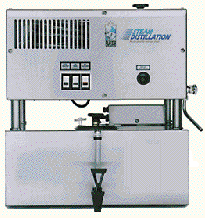Distillation
Distillation is the single most effective method for producting PURE water. The distiller can remove a greater range of pollutants to a higher degree than any other single apparatus. No process, natural or artificial, including filtration, deionization and reverse osmosis is so efficient. For these reasons, distillation has long been recognized as a standard for purity and dependability. Most liquid prescription medicines are blended with distilled water to avoid problems with the inconsistent quality of water. Many doctors prescribe distilled water for their patients to drink, especially those on sodium or salt restriced diets.
Distillation normally removes 99% of the dissolved minerals in water. Carry-over is primarily a concern with volatile organic chemical contaminants. Filtering the distilled water through a carbon filter removes these contaminants. An activated post carbon filter is recommended for this purpose.
Most people know that water is an unreliable source of minerals. Furthermore, they are inorganic minerals that the body has difficulty absorbing. Mineral sources come from food we eat, not the water we drink. These mineral sources are organic and readily assimilated by the body for good health.
A distiller is most desirable for producting point-of-use drinking water for you than any other method of purification. They are durable, dependable and require a minimum of maintenance for continuous operation. With basic care, THEY WILL CONSISTENTLY PRODUCE HIGH QUALITY WATER for the life of the appliance and the quality WILL NOT DECLINE with use. NO PROCESS IS AS EFFECTIVE OR RELIABLE AS DISTILLATION!

26 CT 8 gallons per day
Typical Questions and Answers
1. What is distilled water?
Distilled water is water which has been heated to the boiling point so that impurities are separated from the water, which itself becomes vapor or steam. Steam is then condensed back into pure liquid form. The impurities remain as residue and are removed. These Distillation Systems remove waterborne biological contaminants such as bacteria, viruses, organic and inorganic chemicals, heavy metals, volatile gasses, cysts, and other contaminants. Pure water contains no solids, minerals, or trace elements. It is clean, natural, and healthy. Steam distilled water is the standard by which all other waters are measured.
2. Are there any minerals missing from distilled water that my body needs?
There are two sources of minerals: organic and inorganic. Our bodies cannot assimilate minerals that come from an inorganic source such as the water we drink. Our bodies receive the minerals they assimilate from organic sources such as the food we eat. Distillation removes the minerals out of the water before they can enter the body's system, and distilled water may also remove mineral deposits already there. The minerals our bodies depend on are absorbed and remain in the tissues. Therefore, the safest course of action would seem to be to use a system, such as a distiller, that takes virtually all of the contaminants from your water.
3.Does distilled water leach minerals from my body?
>Distilled water has the inherent characteristics of a magnet and picks up discarded minerals and with the assistance of the blood and lymph, transports them to the kidneys for elimination. It is this kind of mineral elimination that is incorrectly referred to as 'leaching'. The expression that distilled water leaches minerals from the body is inaccurate. Distilled water does not leach out body minerals, it collects and removes minerals which have been rejected by the cells and tissues, which if not evacuated, can cause arterial obstruction and serious bodily damage.
4. Does distilled water taste flat or funny?
People who make this claim have normally only tried room temperature distilled water that may have been sitting on a shelf in a plastic jug for months. Distilled water is actually tasteless. This lack of flavor may take a short while to get used to, but once you get accustomed to drinking distilled water, chlorinated tap water will seem offensive. Tap water has additives, and it is the additives that you taste. Since distilled water adds no foreign substances to your foods, the original tastes and flavors of the foods are retained. Distillers supply fresh, clean, great tasting water made right in your home, affordably, and for your convenience.
5. Are distillers expensive to operate?
These distillers use about 3 KWH of electricity for each gallon of water that is distilled. You can find your personal cost per gallon by multiplying 3 times the KWH rate in your area. You'll probably find that it is a fraction of the cost of buying water at the store or having it delivered.
6. Do some contaminants carry over with the steam in the distillation process?
Some contaminants that have boiling points lower than that of water could carry over, which is why these distillers are equipped with a safety feature: twin volatile gas vents, a patented design feature, which removes most of these contaminants. For even further protection, each distiller is also equipped with a carbon post-filter to provide you with high-quality distilled water with a 99% removal rate of virtually all contaminants.

